Organizational Behaviour: Culture, Motivation, and Team Dynamics
VerifiedAdded on 2024/07/12
|27
|6068
|180
Report
AI Summary
This report provides an analysis of organizational behavior within Vodafone, focusing on how culture, politics, and power influence individual and team performance. It evaluates content and process theories of motivation, examining motivational techniques for effective goal achievement. The report also explores the characteristics of effective teams and analyzes relevant team and group development theories to support dynamic cooperation. Furthermore, it applies organizational behavior concepts and philosophies within Vodafone's context, exploring their positive and negative influences on behavior in a given business situation. The analysis draws upon various theories, including Handy’s cultural typology, French and Raven’s power distribution theory, and Maslow's hierarchy of needs, to provide a comprehensive understanding of organizational dynamics within Vodafone.
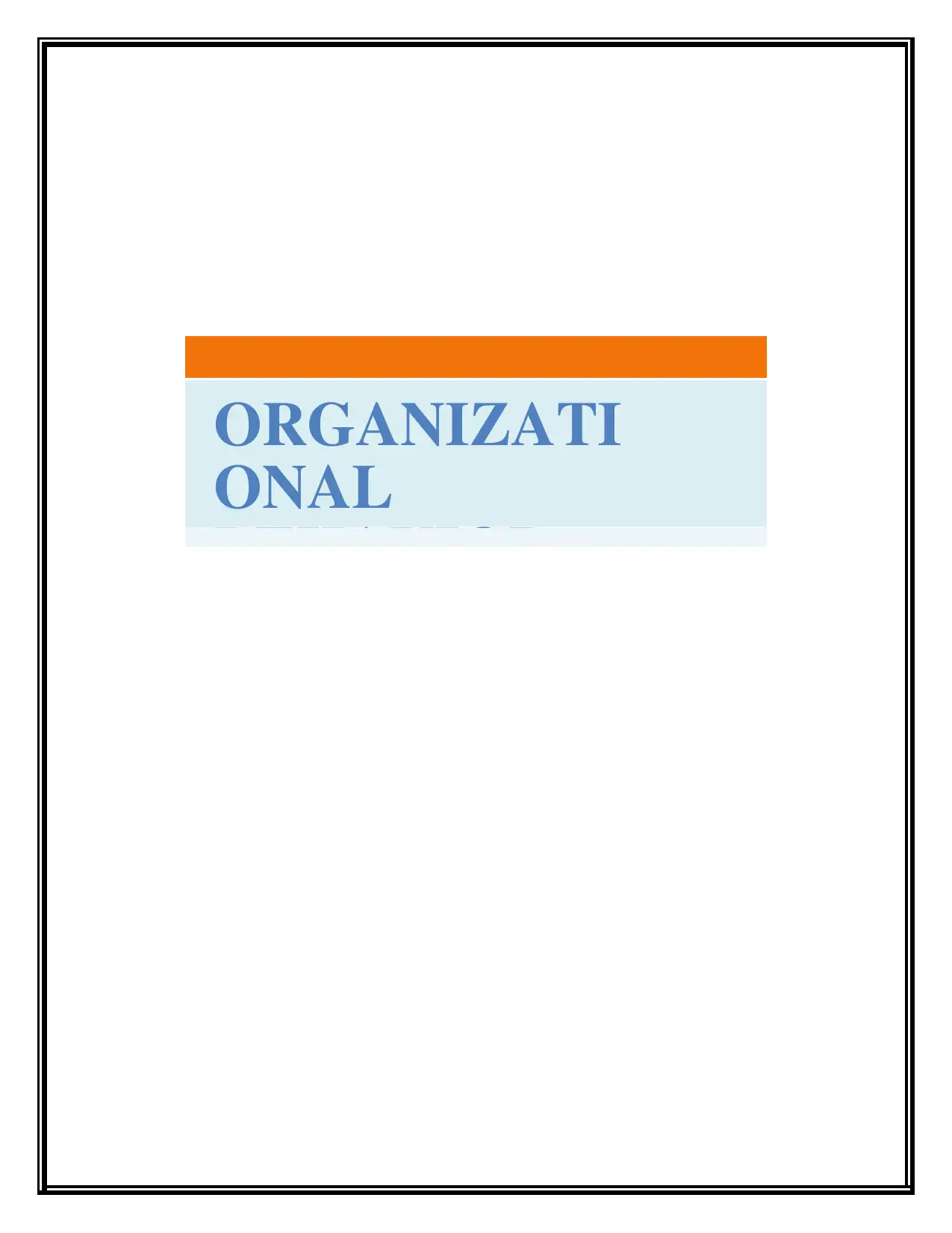
Paraphrase This Document
Need a fresh take? Get an instant paraphrase of this document with our AI Paraphraser
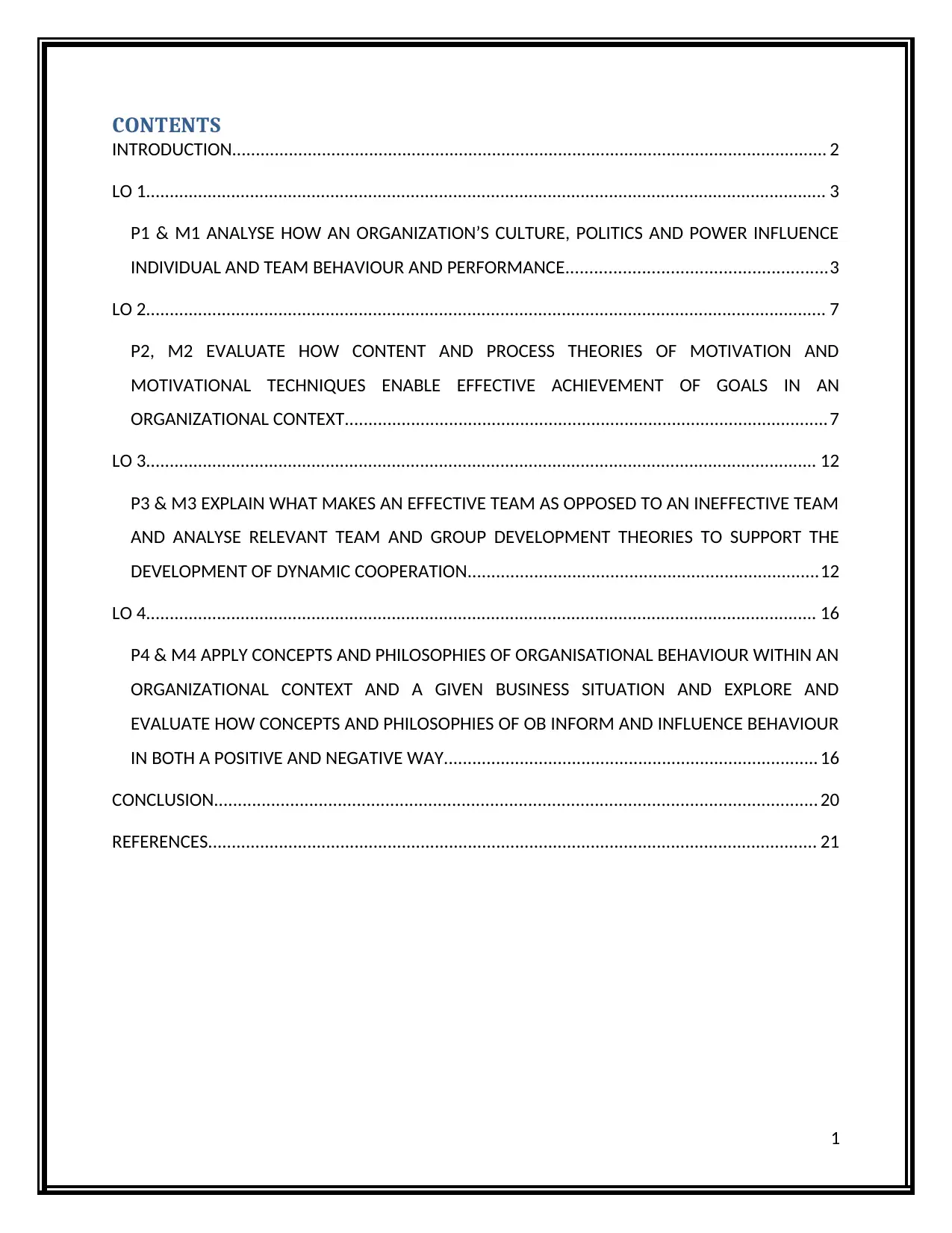
CONTENTS
INTRODUCTION.............................................................................................................................. 2
LO 1................................................................................................................................................ 3
P1 & M1 ANALYSE HOW AN ORGANIZATION’S CULTURE, POLITICS AND POWER INFLUENCE
INDIVIDUAL AND TEAM BEHAVIOUR AND PERFORMANCE.......................................................3
LO 2................................................................................................................................................ 7
P2, M2 EVALUATE HOW CONTENT AND PROCESS THEORIES OF MOTIVATION AND
MOTIVATIONAL TECHNIQUES ENABLE EFFECTIVE ACHIEVEMENT OF GOALS IN AN
ORGANIZATIONAL CONTEXT......................................................................................................7
LO 3.............................................................................................................................................. 12
P3 & M3 EXPLAIN WHAT MAKES AN EFFECTIVE TEAM AS OPPOSED TO AN INEFFECTIVE TEAM
AND ANALYSE RELEVANT TEAM AND GROUP DEVELOPMENT THEORIES TO SUPPORT THE
DEVELOPMENT OF DYNAMIC COOPERATION..........................................................................12
LO 4.............................................................................................................................................. 16
P4 & M4 APPLY CONCEPTS AND PHILOSOPHIES OF ORGANISATIONAL BEHAVIOUR WITHIN AN
ORGANIZATIONAL CONTEXT AND A GIVEN BUSINESS SITUATION AND EXPLORE AND
EVALUATE HOW CONCEPTS AND PHILOSOPHIES OF OB INFORM AND INFLUENCE BEHAVIOUR
IN BOTH A POSITIVE AND NEGATIVE WAY............................................................................... 16
CONCLUSION............................................................................................................................... 20
REFERENCES................................................................................................................................. 21
1
INTRODUCTION.............................................................................................................................. 2
LO 1................................................................................................................................................ 3
P1 & M1 ANALYSE HOW AN ORGANIZATION’S CULTURE, POLITICS AND POWER INFLUENCE
INDIVIDUAL AND TEAM BEHAVIOUR AND PERFORMANCE.......................................................3
LO 2................................................................................................................................................ 7
P2, M2 EVALUATE HOW CONTENT AND PROCESS THEORIES OF MOTIVATION AND
MOTIVATIONAL TECHNIQUES ENABLE EFFECTIVE ACHIEVEMENT OF GOALS IN AN
ORGANIZATIONAL CONTEXT......................................................................................................7
LO 3.............................................................................................................................................. 12
P3 & M3 EXPLAIN WHAT MAKES AN EFFECTIVE TEAM AS OPPOSED TO AN INEFFECTIVE TEAM
AND ANALYSE RELEVANT TEAM AND GROUP DEVELOPMENT THEORIES TO SUPPORT THE
DEVELOPMENT OF DYNAMIC COOPERATION..........................................................................12
LO 4.............................................................................................................................................. 16
P4 & M4 APPLY CONCEPTS AND PHILOSOPHIES OF ORGANISATIONAL BEHAVIOUR WITHIN AN
ORGANIZATIONAL CONTEXT AND A GIVEN BUSINESS SITUATION AND EXPLORE AND
EVALUATE HOW CONCEPTS AND PHILOSOPHIES OF OB INFORM AND INFLUENCE BEHAVIOUR
IN BOTH A POSITIVE AND NEGATIVE WAY............................................................................... 16
CONCLUSION............................................................................................................................... 20
REFERENCES................................................................................................................................. 21
1
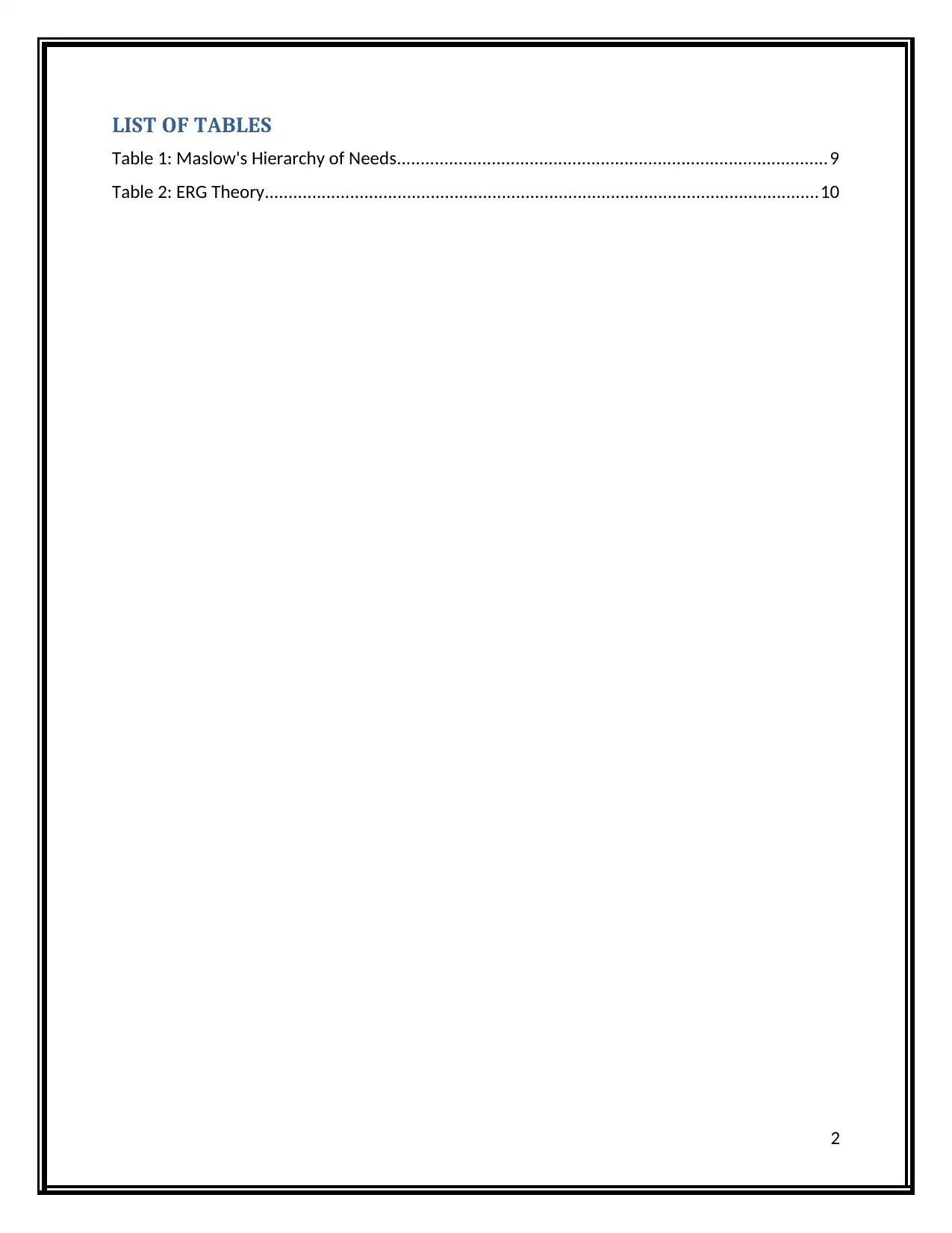
LIST OF TABLES
Table 1: Maslow's Hierarchy of Needs...........................................................................................9
Table 2: ERG Theory.....................................................................................................................10
2
Table 1: Maslow's Hierarchy of Needs...........................................................................................9
Table 2: ERG Theory.....................................................................................................................10
2
⊘ This is a preview!⊘
Do you want full access?
Subscribe today to unlock all pages.

Trusted by 1+ million students worldwide
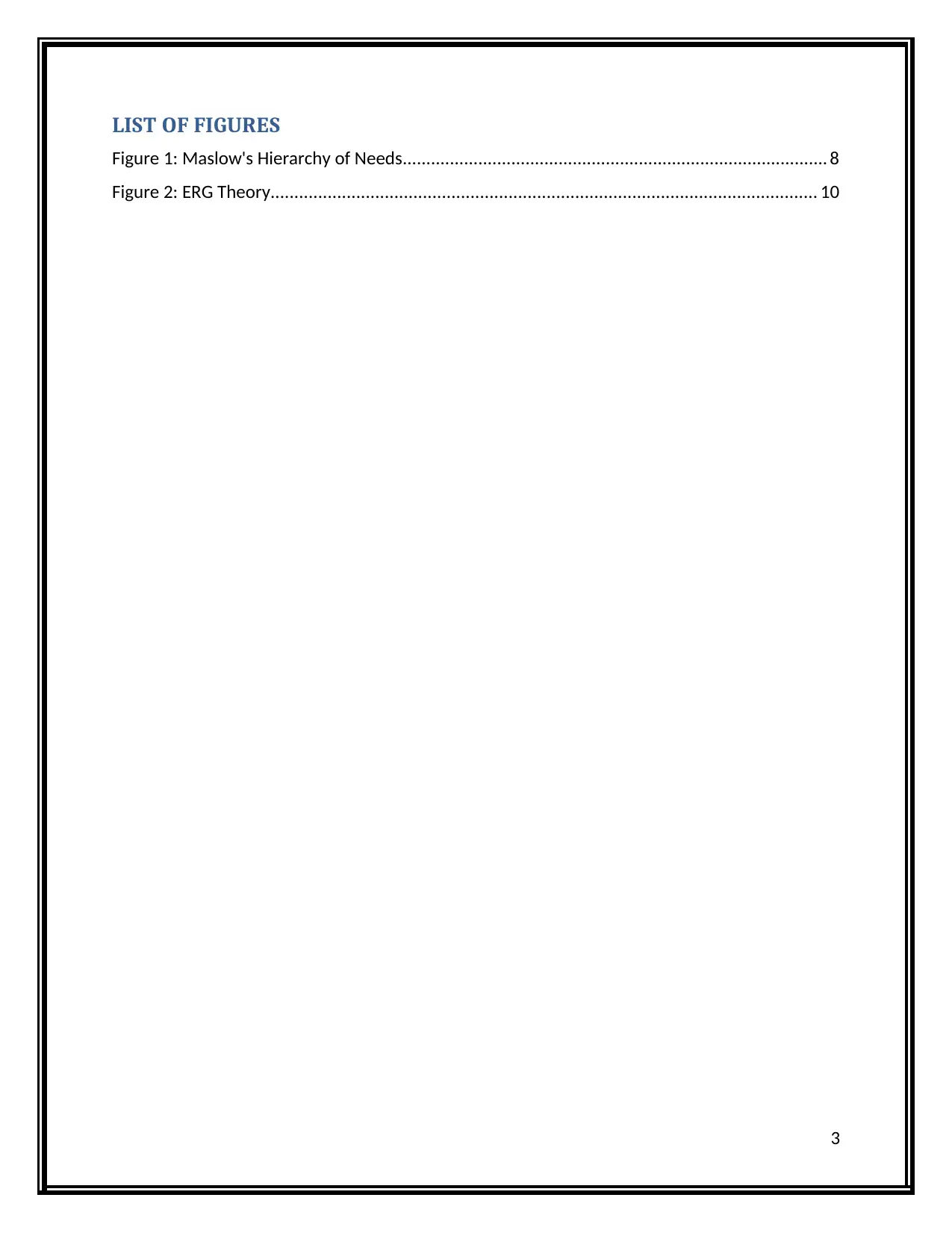
LIST OF FIGURES
Figure 1: Maslow's Hierarchy of Needs.......................................................................................... 8
Figure 2: ERG Theory................................................................................................................... 10
3
Figure 1: Maslow's Hierarchy of Needs.......................................................................................... 8
Figure 2: ERG Theory................................................................................................................... 10
3
Paraphrase This Document
Need a fresh take? Get an instant paraphrase of this document with our AI Paraphraser
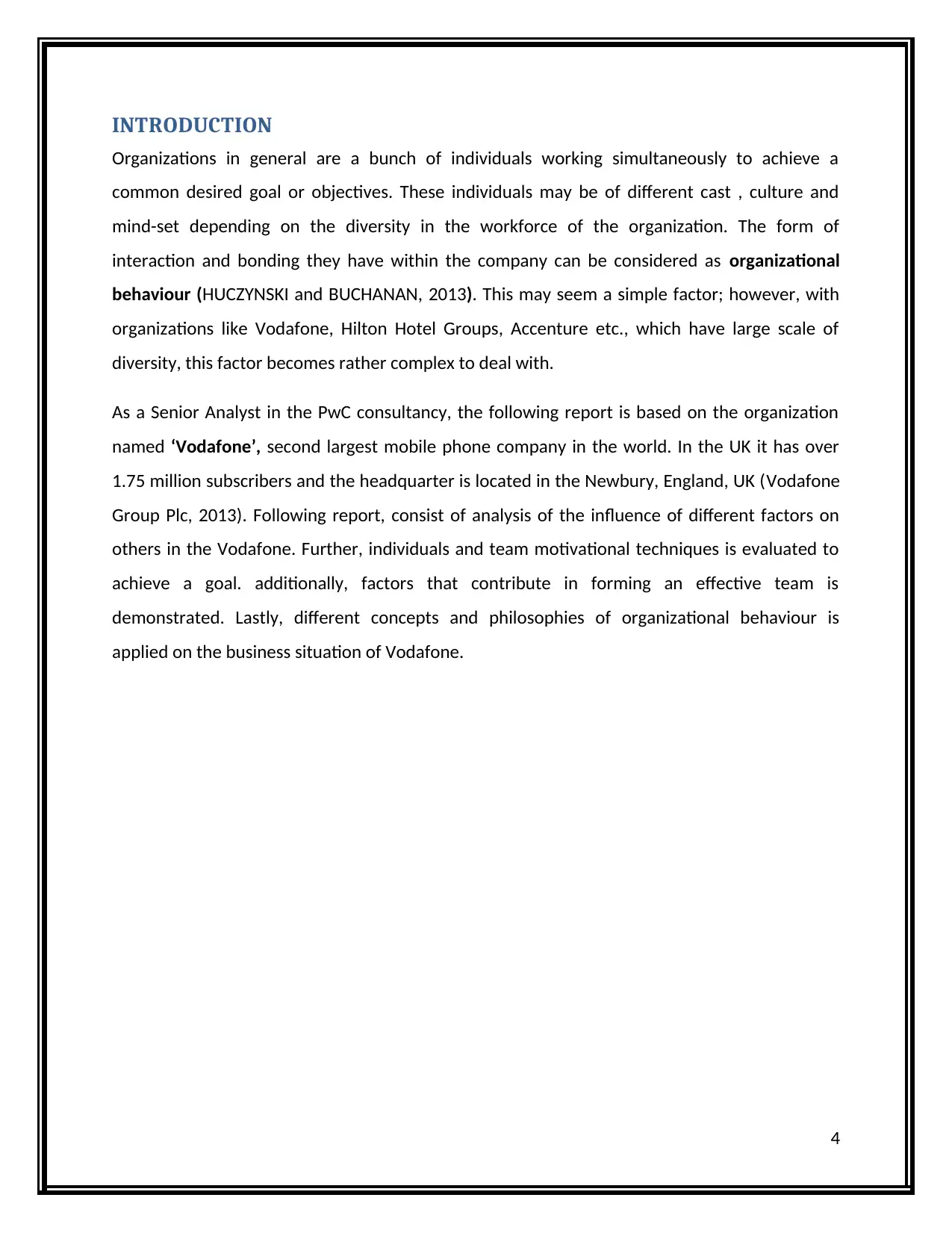
INTRODUCTION
Organizations in general are a bunch of individuals working simultaneously to achieve a
common desired goal or objectives. These individuals may be of different cast , culture and
mind-set depending on the diversity in the workforce of the organization. The form of
interaction and bonding they have within the company can be considered as organizational
behaviour (HUCZYNSKI and BUCHANAN, 2013). This may seem a simple factor; however, with
organizations like Vodafone, Hilton Hotel Groups, Accenture etc., which have large scale of
diversity, this factor becomes rather complex to deal with.
As a Senior Analyst in the PwC consultancy, the following report is based on the organization
named ‘Vodafone’, second largest mobile phone company in the world. In the UK it has over
1.75 million subscribers and the headquarter is located in the Newbury, England, UK (Vodafone
Group Plc, 2013). Following report, consist of analysis of the influence of different factors on
others in the Vodafone. Further, individuals and team motivational techniques is evaluated to
achieve a goal. additionally, factors that contribute in forming an effective team is
demonstrated. Lastly, different concepts and philosophies of organizational behaviour is
applied on the business situation of Vodafone.
4
Organizations in general are a bunch of individuals working simultaneously to achieve a
common desired goal or objectives. These individuals may be of different cast , culture and
mind-set depending on the diversity in the workforce of the organization. The form of
interaction and bonding they have within the company can be considered as organizational
behaviour (HUCZYNSKI and BUCHANAN, 2013). This may seem a simple factor; however, with
organizations like Vodafone, Hilton Hotel Groups, Accenture etc., which have large scale of
diversity, this factor becomes rather complex to deal with.
As a Senior Analyst in the PwC consultancy, the following report is based on the organization
named ‘Vodafone’, second largest mobile phone company in the world. In the UK it has over
1.75 million subscribers and the headquarter is located in the Newbury, England, UK (Vodafone
Group Plc, 2013). Following report, consist of analysis of the influence of different factors on
others in the Vodafone. Further, individuals and team motivational techniques is evaluated to
achieve a goal. additionally, factors that contribute in forming an effective team is
demonstrated. Lastly, different concepts and philosophies of organizational behaviour is
applied on the business situation of Vodafone.
4
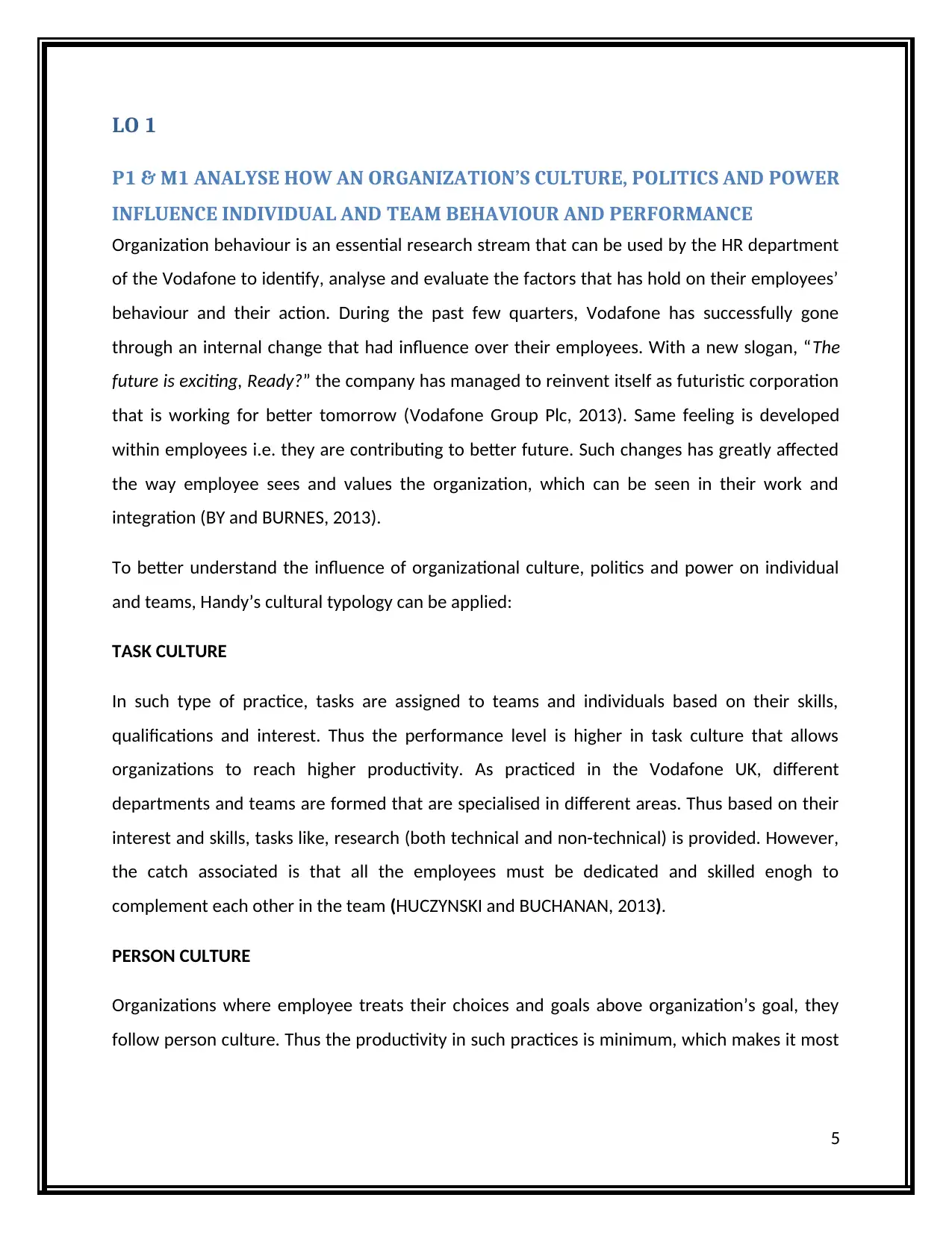
LO 1
P1 & M1 ANALYSE HOW AN ORGANIZATION’S CULTURE, POLITICS AND POWER
INFLUENCE INDIVIDUAL AND TEAM BEHAVIOUR AND PERFORMANCE
Organization behaviour is an essential research stream that can be used by the HR department
of the Vodafone to identify, analyse and evaluate the factors that has hold on their employees’
behaviour and their action. During the past few quarters, Vodafone has successfully gone
through an internal change that had influence over their employees. With a new slogan, “The
future is exciting, Ready?” the company has managed to reinvent itself as futuristic corporation
that is working for better tomorrow (Vodafone Group Plc, 2013). Same feeling is developed
within employees i.e. they are contributing to better future. Such changes has greatly affected
the way employee sees and values the organization, which can be seen in their work and
integration (BY and BURNES, 2013).
To better understand the influence of organizational culture, politics and power on individual
and teams, Handy’s cultural typology can be applied:
TASK CULTURE
In such type of practice, tasks are assigned to teams and individuals based on their skills,
qualifications and interest. Thus the performance level is higher in task culture that allows
organizations to reach higher productivity. As practiced in the Vodafone UK, different
departments and teams are formed that are specialised in different areas. Thus based on their
interest and skills, tasks like, research (both technical and non-technical) is provided. However,
the catch associated is that all the employees must be dedicated and skilled enogh to
complement each other in the team (HUCZYNSKI and BUCHANAN, 2013).
PERSON CULTURE
Organizations where employee treats their choices and goals above organization’s goal, they
follow person culture. Thus the productivity in such practices is minimum, which makes it most
5
P1 & M1 ANALYSE HOW AN ORGANIZATION’S CULTURE, POLITICS AND POWER
INFLUENCE INDIVIDUAL AND TEAM BEHAVIOUR AND PERFORMANCE
Organization behaviour is an essential research stream that can be used by the HR department
of the Vodafone to identify, analyse and evaluate the factors that has hold on their employees’
behaviour and their action. During the past few quarters, Vodafone has successfully gone
through an internal change that had influence over their employees. With a new slogan, “The
future is exciting, Ready?” the company has managed to reinvent itself as futuristic corporation
that is working for better tomorrow (Vodafone Group Plc, 2013). Same feeling is developed
within employees i.e. they are contributing to better future. Such changes has greatly affected
the way employee sees and values the organization, which can be seen in their work and
integration (BY and BURNES, 2013).
To better understand the influence of organizational culture, politics and power on individual
and teams, Handy’s cultural typology can be applied:
TASK CULTURE
In such type of practice, tasks are assigned to teams and individuals based on their skills,
qualifications and interest. Thus the performance level is higher in task culture that allows
organizations to reach higher productivity. As practiced in the Vodafone UK, different
departments and teams are formed that are specialised in different areas. Thus based on their
interest and skills, tasks like, research (both technical and non-technical) is provided. However,
the catch associated is that all the employees must be dedicated and skilled enogh to
complement each other in the team (HUCZYNSKI and BUCHANAN, 2013).
PERSON CULTURE
Organizations where employee treats their choices and goals above organization’s goal, they
follow person culture. Thus the productivity in such practices is minimum, which makes it most
5
⊘ This is a preview!⊘
Do you want full access?
Subscribe today to unlock all pages.

Trusted by 1+ million students worldwide
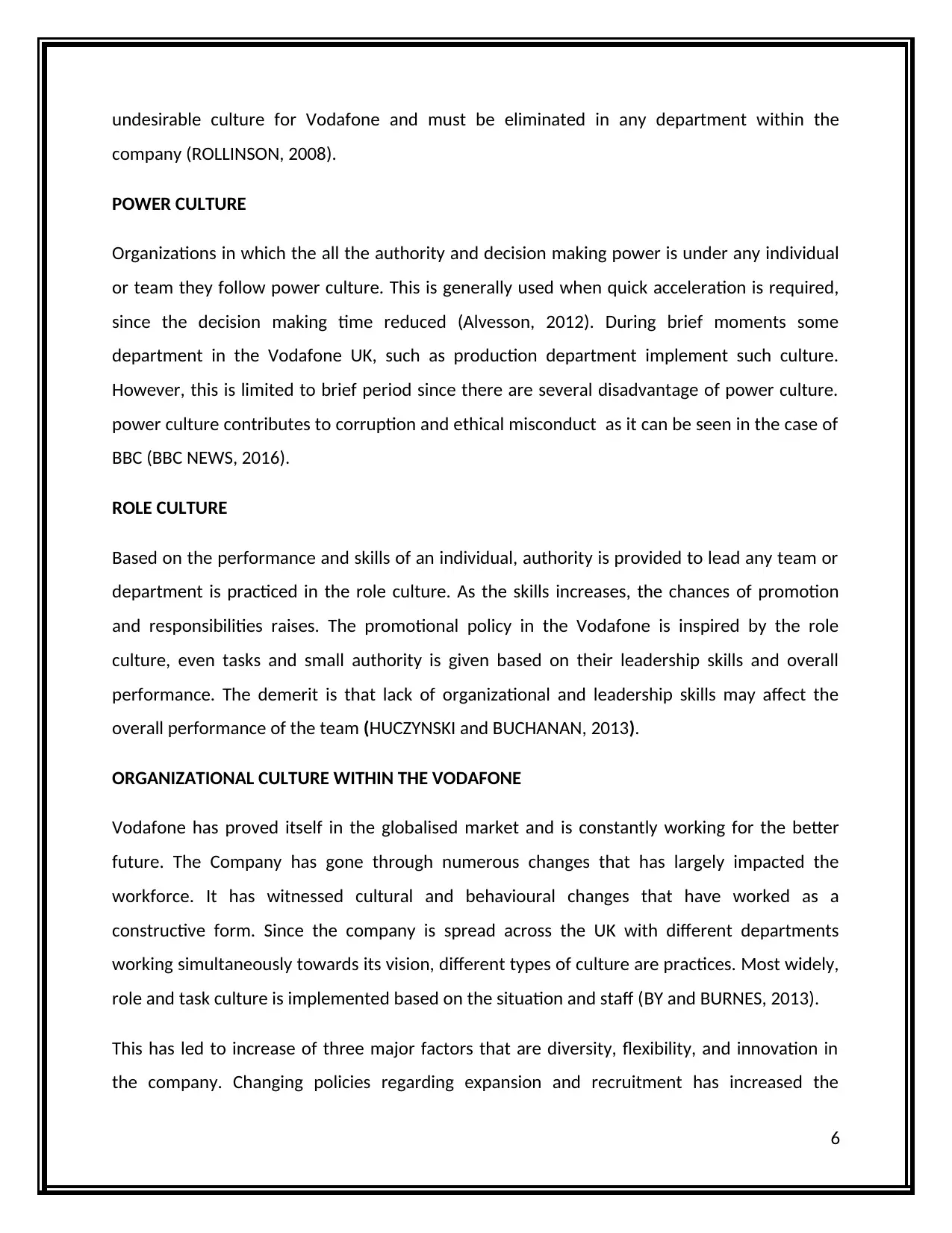
undesirable culture for Vodafone and must be eliminated in any department within the
company (ROLLINSON, 2008).
POWER CULTURE
Organizations in which the all the authority and decision making power is under any individual
or team they follow power culture. This is generally used when quick acceleration is required,
since the decision making time reduced (Alvesson, 2012). During brief moments some
department in the Vodafone UK, such as production department implement such culture.
However, this is limited to brief period since there are several disadvantage of power culture.
power culture contributes to corruption and ethical misconduct as it can be seen in the case of
BBC (BBC NEWS, 2016).
ROLE CULTURE
Based on the performance and skills of an individual, authority is provided to lead any team or
department is practiced in the role culture. As the skills increases, the chances of promotion
and responsibilities raises. The promotional policy in the Vodafone is inspired by the role
culture, even tasks and small authority is given based on their leadership skills and overall
performance. The demerit is that lack of organizational and leadership skills may affect the
overall performance of the team (HUCZYNSKI and BUCHANAN, 2013).
ORGANIZATIONAL CULTURE WITHIN THE VODAFONE
Vodafone has proved itself in the globalised market and is constantly working for the better
future. The Company has gone through numerous changes that has largely impacted the
workforce. It has witnessed cultural and behavioural changes that have worked as a
constructive form. Since the company is spread across the UK with different departments
working simultaneously towards its vision, different types of culture are practices. Most widely,
role and task culture is implemented based on the situation and staff (BY and BURNES, 2013).
This has led to increase of three major factors that are diversity, flexibility, and innovation in
the company. Changing policies regarding expansion and recruitment has increased the
6
company (ROLLINSON, 2008).
POWER CULTURE
Organizations in which the all the authority and decision making power is under any individual
or team they follow power culture. This is generally used when quick acceleration is required,
since the decision making time reduced (Alvesson, 2012). During brief moments some
department in the Vodafone UK, such as production department implement such culture.
However, this is limited to brief period since there are several disadvantage of power culture.
power culture contributes to corruption and ethical misconduct as it can be seen in the case of
BBC (BBC NEWS, 2016).
ROLE CULTURE
Based on the performance and skills of an individual, authority is provided to lead any team or
department is practiced in the role culture. As the skills increases, the chances of promotion
and responsibilities raises. The promotional policy in the Vodafone is inspired by the role
culture, even tasks and small authority is given based on their leadership skills and overall
performance. The demerit is that lack of organizational and leadership skills may affect the
overall performance of the team (HUCZYNSKI and BUCHANAN, 2013).
ORGANIZATIONAL CULTURE WITHIN THE VODAFONE
Vodafone has proved itself in the globalised market and is constantly working for the better
future. The Company has gone through numerous changes that has largely impacted the
workforce. It has witnessed cultural and behavioural changes that have worked as a
constructive form. Since the company is spread across the UK with different departments
working simultaneously towards its vision, different types of culture are practices. Most widely,
role and task culture is implemented based on the situation and staff (BY and BURNES, 2013).
This has led to increase of three major factors that are diversity, flexibility, and innovation in
the company. Changing policies regarding expansion and recruitment has increased the
6
Paraphrase This Document
Need a fresh take? Get an instant paraphrase of this document with our AI Paraphraser
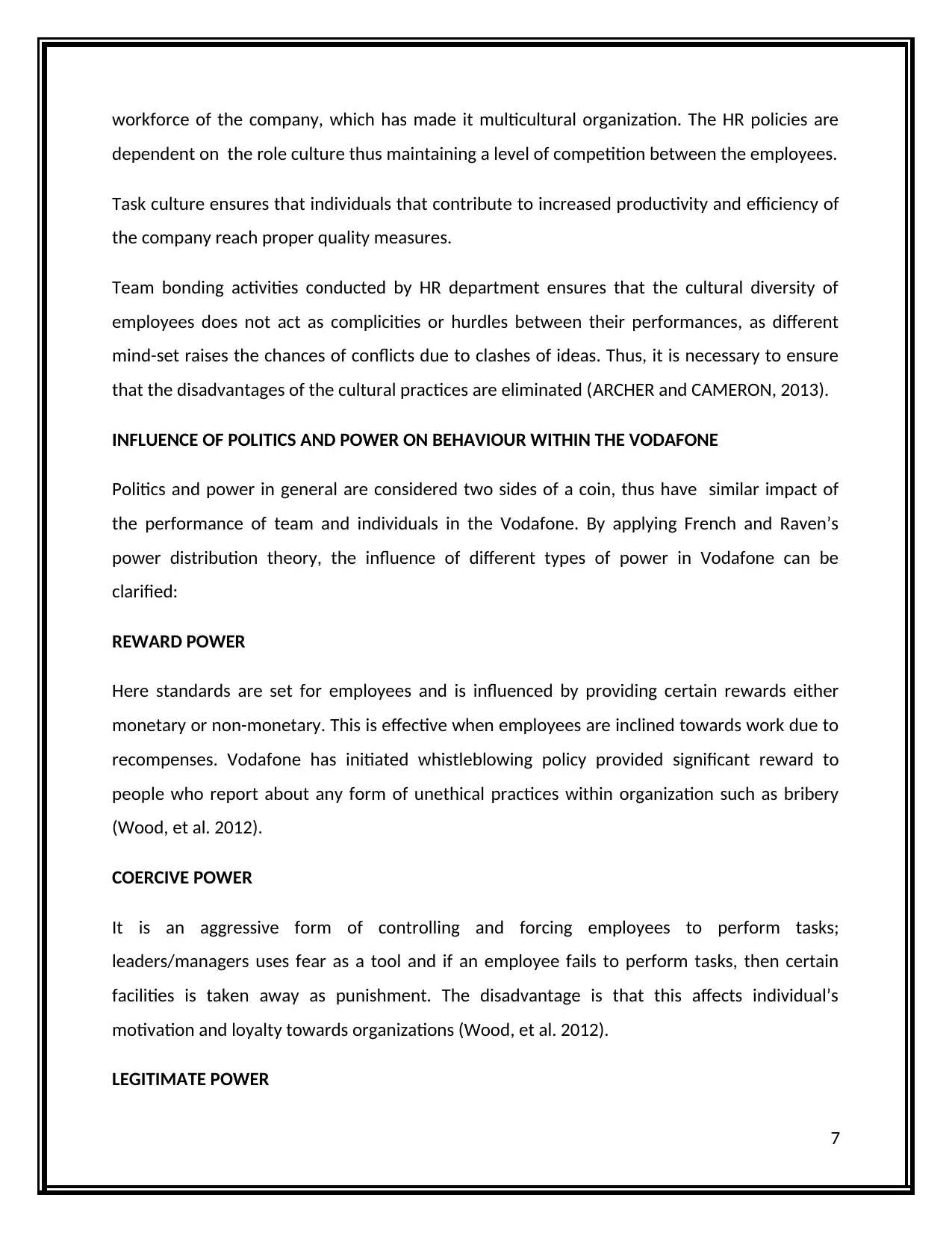
workforce of the company, which has made it multicultural organization. The HR policies are
dependent on the role culture thus maintaining a level of competition between the employees.
Task culture ensures that individuals that contribute to increased productivity and efficiency of
the company reach proper quality measures.
Team bonding activities conducted by HR department ensures that the cultural diversity of
employees does not act as complicities or hurdles between their performances, as different
mind-set raises the chances of conflicts due to clashes of ideas. Thus, it is necessary to ensure
that the disadvantages of the cultural practices are eliminated (ARCHER and CAMERON, 2013).
INFLUENCE OF POLITICS AND POWER ON BEHAVIOUR WITHIN THE VODAFONE
Politics and power in general are considered two sides of a coin, thus have similar impact of
the performance of team and individuals in the Vodafone. By applying French and Raven’s
power distribution theory, the influence of different types of power in Vodafone can be
clarified:
REWARD POWER
Here standards are set for employees and is influenced by providing certain rewards either
monetary or non-monetary. This is effective when employees are inclined towards work due to
recompenses. Vodafone has initiated whistleblowing policy provided significant reward to
people who report about any form of unethical practices within organization such as bribery
(Wood, et al. 2012).
COERCIVE POWER
It is an aggressive form of controlling and forcing employees to perform tasks;
leaders/managers uses fear as a tool and if an employee fails to perform tasks, then certain
facilities is taken away as punishment. The disadvantage is that this affects individual’s
motivation and loyalty towards organizations (Wood, et al. 2012).
LEGITIMATE POWER
7
dependent on the role culture thus maintaining a level of competition between the employees.
Task culture ensures that individuals that contribute to increased productivity and efficiency of
the company reach proper quality measures.
Team bonding activities conducted by HR department ensures that the cultural diversity of
employees does not act as complicities or hurdles between their performances, as different
mind-set raises the chances of conflicts due to clashes of ideas. Thus, it is necessary to ensure
that the disadvantages of the cultural practices are eliminated (ARCHER and CAMERON, 2013).
INFLUENCE OF POLITICS AND POWER ON BEHAVIOUR WITHIN THE VODAFONE
Politics and power in general are considered two sides of a coin, thus have similar impact of
the performance of team and individuals in the Vodafone. By applying French and Raven’s
power distribution theory, the influence of different types of power in Vodafone can be
clarified:
REWARD POWER
Here standards are set for employees and is influenced by providing certain rewards either
monetary or non-monetary. This is effective when employees are inclined towards work due to
recompenses. Vodafone has initiated whistleblowing policy provided significant reward to
people who report about any form of unethical practices within organization such as bribery
(Wood, et al. 2012).
COERCIVE POWER
It is an aggressive form of controlling and forcing employees to perform tasks;
leaders/managers uses fear as a tool and if an employee fails to perform tasks, then certain
facilities is taken away as punishment. The disadvantage is that this affects individual’s
motivation and loyalty towards organizations (Wood, et al. 2012).
LEGITIMATE POWER
7
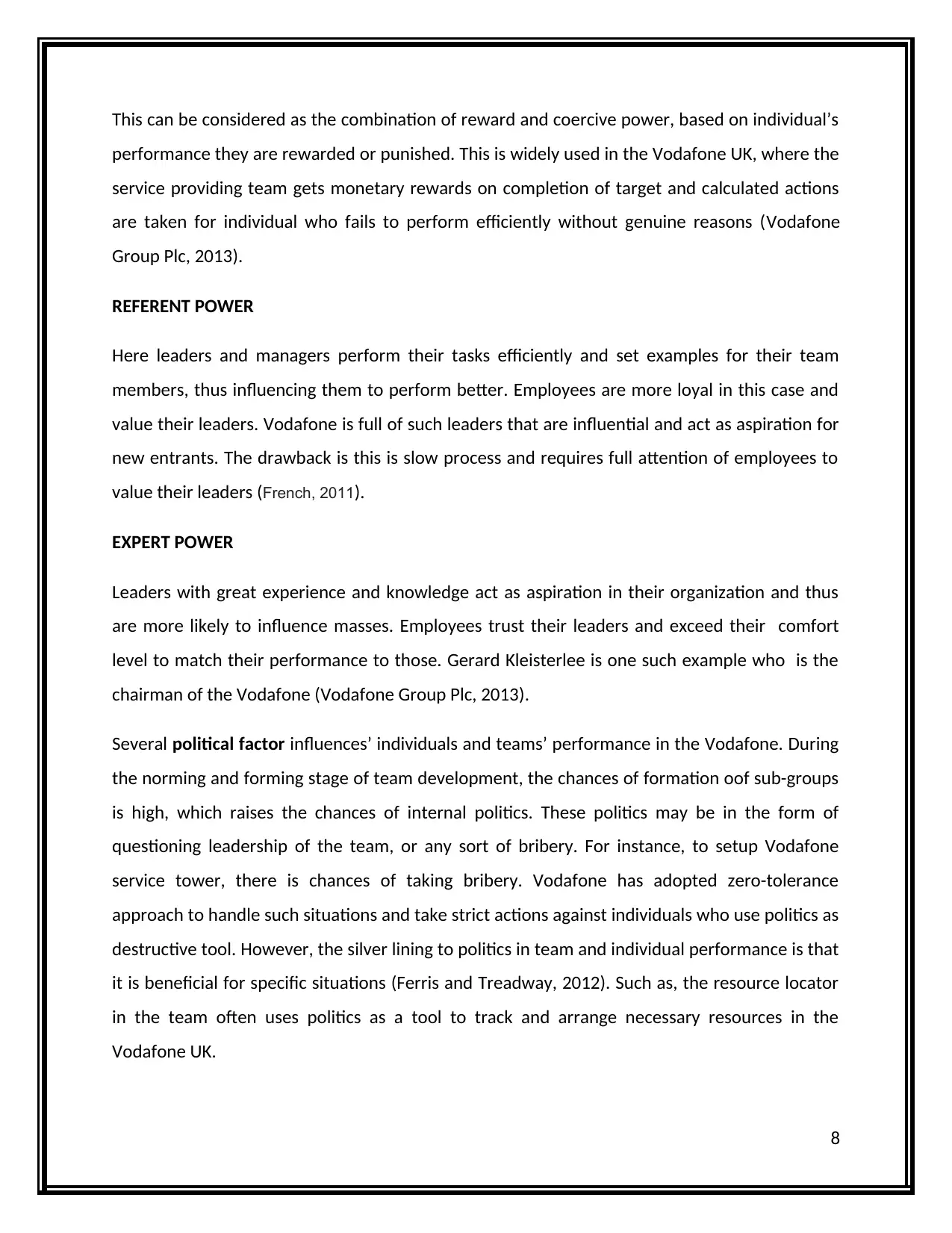
This can be considered as the combination of reward and coercive power, based on individual’s
performance they are rewarded or punished. This is widely used in the Vodafone UK, where the
service providing team gets monetary rewards on completion of target and calculated actions
are taken for individual who fails to perform efficiently without genuine reasons (Vodafone
Group Plc, 2013).
REFERENT POWER
Here leaders and managers perform their tasks efficiently and set examples for their team
members, thus influencing them to perform better. Employees are more loyal in this case and
value their leaders. Vodafone is full of such leaders that are influential and act as aspiration for
new entrants. The drawback is this is slow process and requires full attention of employees to
value their leaders (French, 2011).
EXPERT POWER
Leaders with great experience and knowledge act as aspiration in their organization and thus
are more likely to influence masses. Employees trust their leaders and exceed their comfort
level to match their performance to those. Gerard Kleisterlee is one such example who is the
chairman of the Vodafone (Vodafone Group Plc, 2013).
Several political factor influences’ individuals and teams’ performance in the Vodafone. During
the norming and forming stage of team development, the chances of formation oof sub-groups
is high, which raises the chances of internal politics. These politics may be in the form of
questioning leadership of the team, or any sort of bribery. For instance, to setup Vodafone
service tower, there is chances of taking bribery. Vodafone has adopted zero-tolerance
approach to handle such situations and take strict actions against individuals who use politics as
destructive tool. However, the silver lining to politics in team and individual performance is that
it is beneficial for specific situations (Ferris and Treadway, 2012). Such as, the resource locator
in the team often uses politics as a tool to track and arrange necessary resources in the
Vodafone UK.
8
performance they are rewarded or punished. This is widely used in the Vodafone UK, where the
service providing team gets monetary rewards on completion of target and calculated actions
are taken for individual who fails to perform efficiently without genuine reasons (Vodafone
Group Plc, 2013).
REFERENT POWER
Here leaders and managers perform their tasks efficiently and set examples for their team
members, thus influencing them to perform better. Employees are more loyal in this case and
value their leaders. Vodafone is full of such leaders that are influential and act as aspiration for
new entrants. The drawback is this is slow process and requires full attention of employees to
value their leaders (French, 2011).
EXPERT POWER
Leaders with great experience and knowledge act as aspiration in their organization and thus
are more likely to influence masses. Employees trust their leaders and exceed their comfort
level to match their performance to those. Gerard Kleisterlee is one such example who is the
chairman of the Vodafone (Vodafone Group Plc, 2013).
Several political factor influences’ individuals and teams’ performance in the Vodafone. During
the norming and forming stage of team development, the chances of formation oof sub-groups
is high, which raises the chances of internal politics. These politics may be in the form of
questioning leadership of the team, or any sort of bribery. For instance, to setup Vodafone
service tower, there is chances of taking bribery. Vodafone has adopted zero-tolerance
approach to handle such situations and take strict actions against individuals who use politics as
destructive tool. However, the silver lining to politics in team and individual performance is that
it is beneficial for specific situations (Ferris and Treadway, 2012). Such as, the resource locator
in the team often uses politics as a tool to track and arrange necessary resources in the
Vodafone UK.
8
⊘ This is a preview!⊘
Do you want full access?
Subscribe today to unlock all pages.

Trusted by 1+ million students worldwide
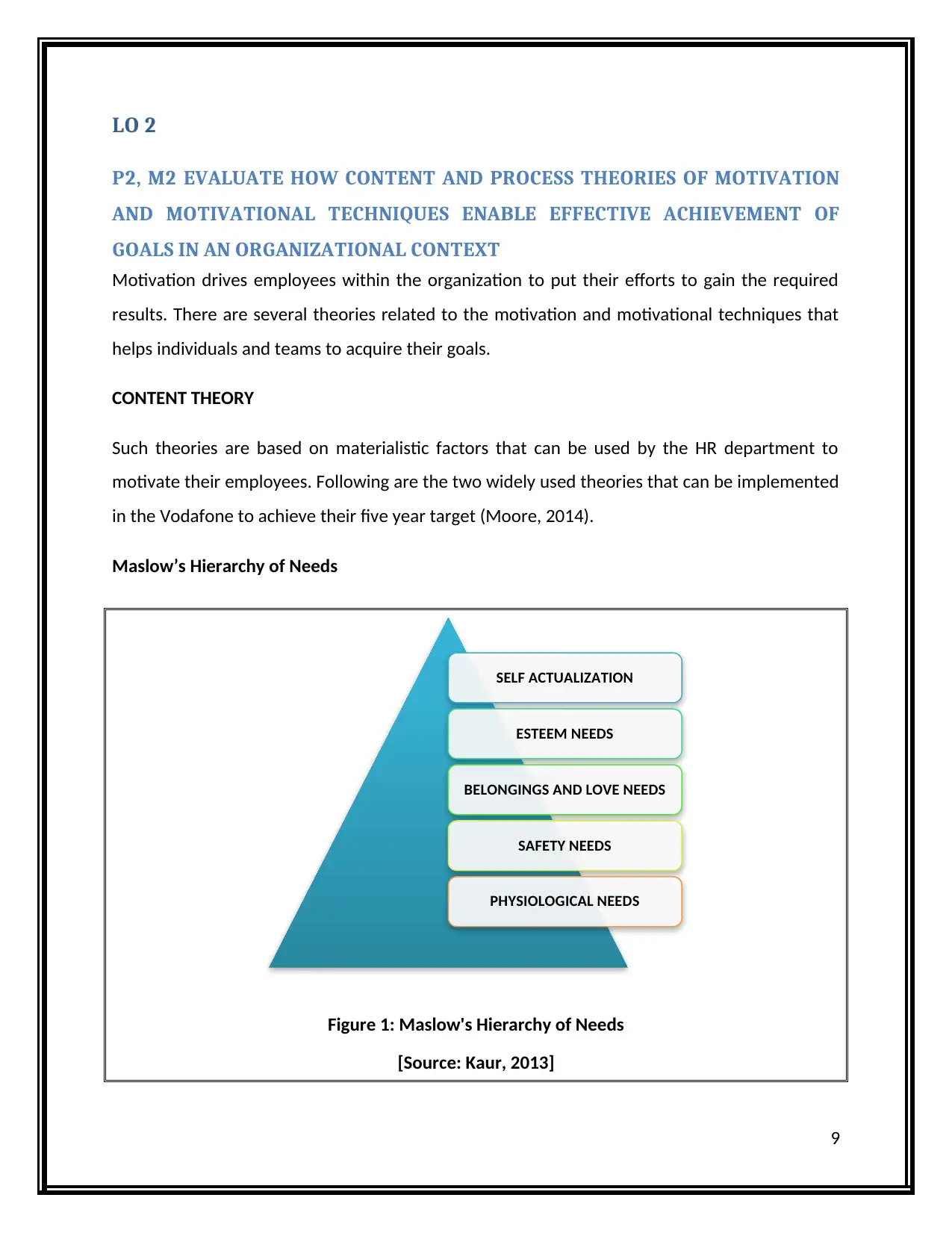
LO 2
P2, M2 EVALUATE HOW CONTENT AND PROCESS THEORIES OF MOTIVATION
AND MOTIVATIONAL TECHNIQUES ENABLE EFFECTIVE ACHIEVEMENT OF
GOALS IN AN ORGANIZATIONAL CONTEXT
Motivation drives employees within the organization to put their efforts to gain the required
results. There are several theories related to the motivation and motivational techniques that
helps individuals and teams to acquire their goals.
CONTENT THEORY
Such theories are based on materialistic factors that can be used by the HR department to
motivate their employees. Following are the two widely used theories that can be implemented
in the Vodafone to achieve their five year target (Moore, 2014).
Maslow’s Hierarchy of Needs
Figure 1: Maslow's Hierarchy of Needs
[Source: Kaur, 2013]
9
SELF ACTUALIZATION
ESTEEM NEEDS
BELONGINGS AND LOVE NEEDS
SAFETY NEEDS
PHYSIOLOGICAL NEEDS
P2, M2 EVALUATE HOW CONTENT AND PROCESS THEORIES OF MOTIVATION
AND MOTIVATIONAL TECHNIQUES ENABLE EFFECTIVE ACHIEVEMENT OF
GOALS IN AN ORGANIZATIONAL CONTEXT
Motivation drives employees within the organization to put their efforts to gain the required
results. There are several theories related to the motivation and motivational techniques that
helps individuals and teams to acquire their goals.
CONTENT THEORY
Such theories are based on materialistic factors that can be used by the HR department to
motivate their employees. Following are the two widely used theories that can be implemented
in the Vodafone to achieve their five year target (Moore, 2014).
Maslow’s Hierarchy of Needs
Figure 1: Maslow's Hierarchy of Needs
[Source: Kaur, 2013]
9
SELF ACTUALIZATION
ESTEEM NEEDS
BELONGINGS AND LOVE NEEDS
SAFETY NEEDS
PHYSIOLOGICAL NEEDS
Paraphrase This Document
Need a fresh take? Get an instant paraphrase of this document with our AI Paraphraser
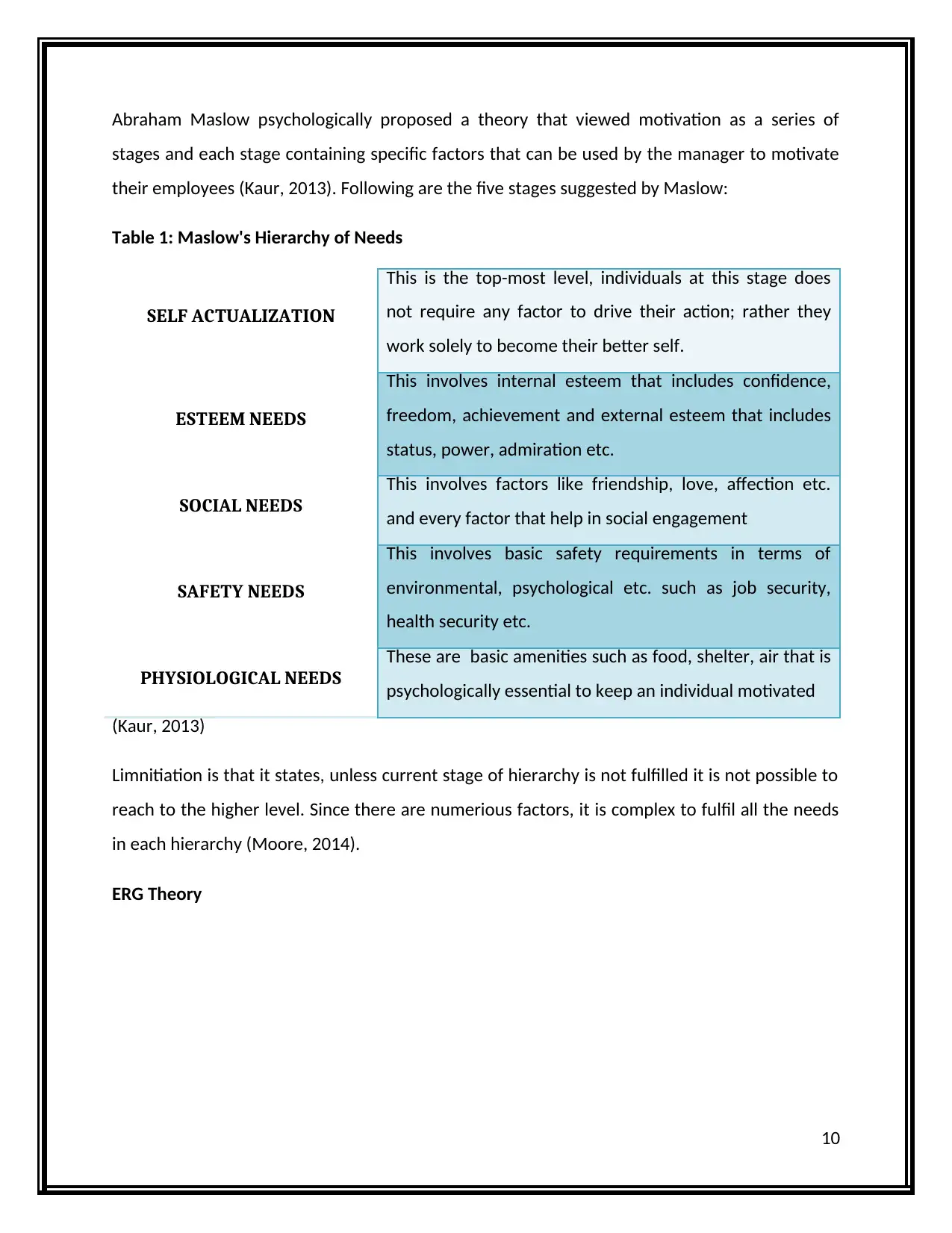
Abraham Maslow psychologically proposed a theory that viewed motivation as a series of
stages and each stage containing specific factors that can be used by the manager to motivate
their employees (Kaur, 2013). Following are the five stages suggested by Maslow:
Table 1: Maslow's Hierarchy of Needs
SELF ACTUALIZATION
This is the top-most level, individuals at this stage does
not require any factor to drive their action; rather they
work solely to become their better self.
ESTEEM NEEDS
This involves internal esteem that includes confidence,
freedom, achievement and external esteem that includes
status, power, admiration etc.
SOCIAL NEEDS
This involves factors like friendship, love, affection etc.
and every factor that help in social engagement
SAFETY NEEDS
This involves basic safety requirements in terms of
environmental, psychological etc. such as job security,
health security etc.
PHYSIOLOGICAL NEEDS
These are basic amenities such as food, shelter, air that is
psychologically essential to keep an individual motivated
(Kaur, 2013)
Limnitiation is that it states, unless current stage of hierarchy is not fulfilled it is not possible to
reach to the higher level. Since there are numerious factors, it is complex to fulfil all the needs
in each hierarchy (Moore, 2014).
ERG Theory
10
stages and each stage containing specific factors that can be used by the manager to motivate
their employees (Kaur, 2013). Following are the five stages suggested by Maslow:
Table 1: Maslow's Hierarchy of Needs
SELF ACTUALIZATION
This is the top-most level, individuals at this stage does
not require any factor to drive their action; rather they
work solely to become their better self.
ESTEEM NEEDS
This involves internal esteem that includes confidence,
freedom, achievement and external esteem that includes
status, power, admiration etc.
SOCIAL NEEDS
This involves factors like friendship, love, affection etc.
and every factor that help in social engagement
SAFETY NEEDS
This involves basic safety requirements in terms of
environmental, psychological etc. such as job security,
health security etc.
PHYSIOLOGICAL NEEDS
These are basic amenities such as food, shelter, air that is
psychologically essential to keep an individual motivated
(Kaur, 2013)
Limnitiation is that it states, unless current stage of hierarchy is not fulfilled it is not possible to
reach to the higher level. Since there are numerious factors, it is complex to fulfil all the needs
in each hierarchy (Moore, 2014).
ERG Theory
10
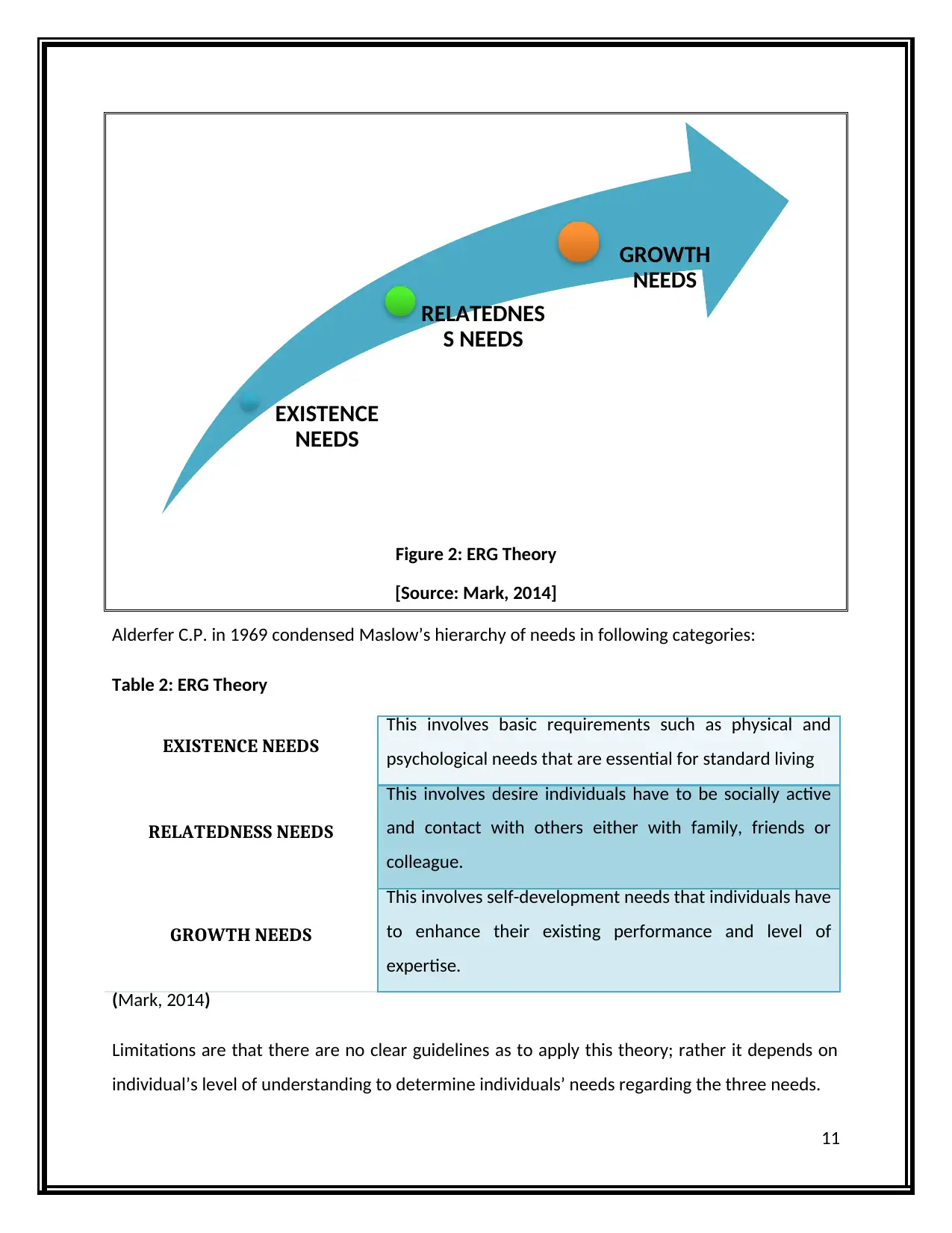
Figure 2: ERG Theory
[Source: Mark, 2014]
Alderfer C.P. in 1969 condensed Maslow’s hierarchy of needs in following categories:
Table 2: ERG Theory
EXISTENCE NEEDS
This involves basic requirements such as physical and
psychological needs that are essential for standard living
RELATEDNESS NEEDS
This involves desire individuals have to be socially active
and contact with others either with family, friends or
colleague.
GROWTH NEEDS
This involves self-development needs that individuals have
to enhance their existing performance and level of
expertise.
(Mark, 2014)
Limitations are that there are no clear guidelines as to apply this theory; rather it depends on
individual’s level of understanding to determine individuals’ needs regarding the three needs.
11
EXISTENCE
NEEDS
RELATEDNES
S NEEDS
GROWTH
NEEDS
[Source: Mark, 2014]
Alderfer C.P. in 1969 condensed Maslow’s hierarchy of needs in following categories:
Table 2: ERG Theory
EXISTENCE NEEDS
This involves basic requirements such as physical and
psychological needs that are essential for standard living
RELATEDNESS NEEDS
This involves desire individuals have to be socially active
and contact with others either with family, friends or
colleague.
GROWTH NEEDS
This involves self-development needs that individuals have
to enhance their existing performance and level of
expertise.
(Mark, 2014)
Limitations are that there are no clear guidelines as to apply this theory; rather it depends on
individual’s level of understanding to determine individuals’ needs regarding the three needs.
11
EXISTENCE
NEEDS
RELATEDNES
S NEEDS
GROWTH
NEEDS
⊘ This is a preview!⊘
Do you want full access?
Subscribe today to unlock all pages.

Trusted by 1+ million students worldwide
1 out of 27
Related Documents
Your All-in-One AI-Powered Toolkit for Academic Success.
+13062052269
info@desklib.com
Available 24*7 on WhatsApp / Email
![[object Object]](/_next/static/media/star-bottom.7253800d.svg)
Unlock your academic potential
Copyright © 2020–2026 A2Z Services. All Rights Reserved. Developed and managed by ZUCOL.




